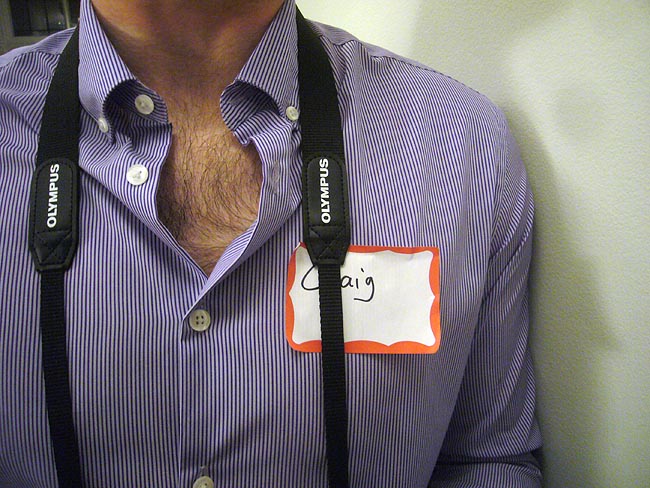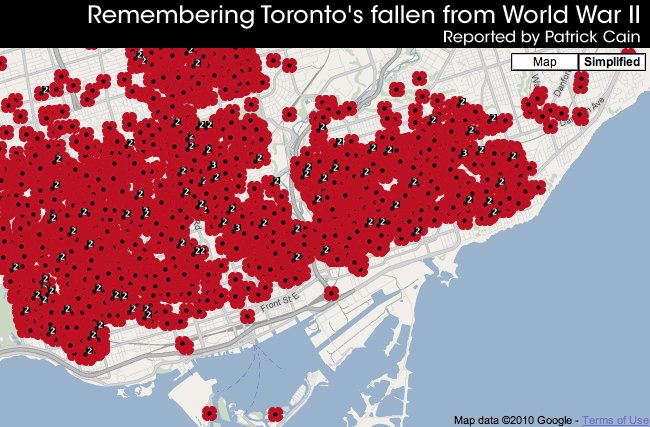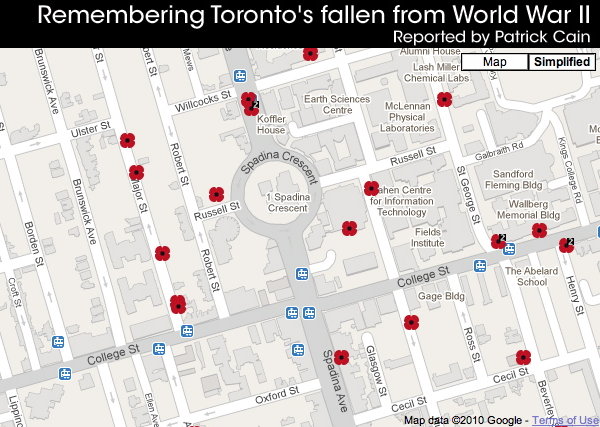The second Hacks & Hackers event was two days ago (2010.12.14) at Unspace, complete with iPad-wielding concierge, coat racks, and open bar.

Craig Silverman’s chest hair
Presentations began with what amounted to a promotional announcement from an Unspace user – a startup that has developed an overcomplicated, unscalable interface for classifying music by its emotional character. (The use case is music supervisors for movies. A single company’s repertoire of 400 songs – the actual client’s repertoire – may be a drop in the bucket for such supervisors, or may be irrelevant because they pride themselves on instant recall and powers of association cultivated through a lifetime’s music-listening.)
I was not clear on why we were being subjected to a technology demo unrelated to journalism. This would become a pattern. Two of the four presentations (esteemed colleague K-Hug’s MyTTC; Anna SOB’s use of APIs to pull in boxes of related information while you’re trying to watch a video) were better suited to a DemoCamp or moral equivalent. Hacks & Hackers is not another venue to demo random tech projects. (Next up: Fat nerds lecturing us on “FOSS”?)
The other two presentations were journalistic – Dwight Friesen’s on pulling in live results from the 2010 municipal election, and OpenFile’s Poppy project for Remembrance Day. The former represented a new way of reporting the facts, with the goal of giving the (implicitly not-blind) television viewer the results before a CBC newscaster could put them into words. The latter included custom-written biographies of four fallen soldiers, but was otherwise a data-visualization exercise. And I have issues with that.
I reiterate my concern here: If there is any general impression of what hackers can do for hacks, it’s a mental image of a Google map with a bunch of pins on it. In other words, turning databases into nice graphics. Writers don’t know how to do that, which “explains” why they “need” programmers at Hacks & Hackers meetups. (When you get right down to it, implicit throughout this movement is the idea that hacks need hackers.) But I know for a fact this is not all or even most of what Adrian Holovaty had in mind when he pioneered data journalism.
Our purpose in forcing hacks and hackers to mingle is not to find another cute use for Google Maps. It isn’t true that hackers can help out hacks mostly by whipping up some kind of dataviz.
Besides, even in the OpenFile example there was a harmful lack of cartographic literacy or even understanding of scale. Its visualization of Toronto’s war dead (which, incidentally, was nothing but a static image on my iTouch when I checked it during the demo) gives the impression of a city map almost overrun with poppies, a symbol chosen for war dead or their survivors.

We were told this near-contiguous mass of red taught us the unexpected lesson that the city was awash in casualties. The truth is the poppies are massively overscaled for full-city view and, when you zoom in, turn out to be the size of four detached houses.

In fact only a fraction of Toronto’s residences were home to war dead or their survivors, but the out-of-scale bird’s-eye view misleads you into thinking the opposite. (Fixes are easy: Set a tighter default zoom and post a disclaimer.)
If you walk into data journalism thinking your entire job is feeding numbers into the Google Maps API, you’re already missing the point. If you don’t have enough literacy to understand when the picture you generate misleads the viewer, you have failed outright.
What’s in it for writers?
Another of my esteemed colleagues and I debated this at length. Hacks & Hackers Toronto is a nice comfortable playground for programmers who already kind of know each other to talk shop and show off their dataviz. I’m OK with that. But what happens if we put the writers at the centre of the project? What are writers expected to teach hackers? What are hacks expected to learn from hackers?
I have my own ideas in this respect and my esteemed colleague backs me up on them. We need to train writers in basic technical skills. They’re the same skills whose absence I’ve been complaining about for years – and here I am ready to do something about it. I’ve been willing and able to remedy the problem since the first Hacks & Hackers event, but I guess it was just simpler to ask people we already knew to get up in front of an audience and give the kind of technology demo we’re already familiar with.
My esteemed colleague and I plan to offer two back-to-back 20-minute sessions on Unicode: One for writers on what Unicode is, how to avoid errors, and what to do when common errors happen, and a second one for programmers on how to unfuck your internal systems so that errors don’t happen in the first place. We’ll need a room with wifi and seating for everyone. Open bar is rather optional; haven’t we got work to do?